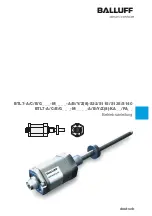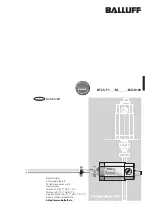
Ranger Long-Range Wireless Radio Transmitter
2177 Leghorn Street
01602-001 - Rev. 1.2
Mountain View, CA 94043-1605 USA
2 of 2
Tel: +1-650-964-2615 Fax: +1-650-988-6687
Web: www.farpointedata.com E-mail: [email protected]
In
stallation Guide
WR
T-
4 T
ransmit
ter
3.0
Output Formats
Transmitters are sequentially coded in either the industry standard 26-bit Wiegand format or custom Wie-
gand formats, with exact number sequences. As a cross reference the Transmitters’ internal ID number is
printed on the ID label found on the back of the Transmitter.
Specific coding details, including format, facility code, and ID range can be found on the Transmitter ship-
ping box, as well as the shipment’s packing list.
4.0
Battery Replacement
Transmitters include a replaceable CR2032, 3 Volt lithium battery
1
. The battery should be replaced when a
button press does not result in a flash of the LED, reliable read range, and/or an output from the Receiver. To
replace the battery, follow the directions below:
1. Unsnap the back of the case using a small coin.
2. Remove the old battery.
2
3. Insert the new CR2032 3 Volt lithium battery. Be sure the plus (+) side of the battery is oriented accord-
ing to marking inside of unit.
4. Replace the back of the case, snapping it back into place.
5.0
Range
3
Maximum read range between the Transmitter and Receiver is up to 150-feet (45.7 m).
4
Farpointe Data reserves the right to change specifications at any and without notice.
© 2009 Farpointe Data, Inc. All rights reserved.
Protected by U. S. and worldwide patents.
Farpointe Data, Inc. and the Farpointe Data logo are registered trademarks of Farpointe Data, Inc.
HID is a registered trademarks of HID Global. MIFARE is a registered trademark of NXP B.V.
All other trademarks, service marks, and product or service names are trademarks or registered trademarks of their respective owners.
1. The CR2032 3 Volt lithium battery was specifically selected for use with the Ranger Transmitter. When placing, only use
this type of battery. It supports a relatively high current drain when used on an intermittent basis, such as when a button
is pressed. This alkaline battery is widely available, and commonly used in electronic devices, including cameras.
2. Dispose of the battery according to local requirements. Recycle when possible.
3. For best performance it is important that the Transmitter be used as far from interference sources as possible. These
sources may include, but are not limited to, large metal obstructions, such as duct work and appliances, as well as mag-
netic fields and radio emissions.
4. The read range between the Transmitter and Receiver may be adjusted at the Receiver. As shipped, the Receiver is set for
the maximum read range. This may be reduced to a minimum of several feet by an adjustment on the Receiver.




















